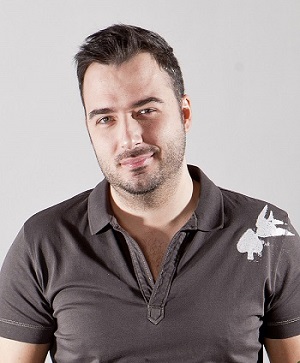Tribeca Interviews — ‘Love & Engineering’ Director Tonislav Hristov Searches for Romance

Pictured: Filmmaker Tonislav Hristov. Photo Credit: TFF.
GALO: Why not? Was there a problem in terms of thinking too hard about attraction and romance? Did overthinking become an obstacle?
TH: When I think of an engineer, I think that the main problem with my friends and with modern day men is the idea of the comfort zone. We have built up this comfort zone around us and it’s really hard for us to get out of it. We don’t want to bother. Engineers are well-educated, well-paid and they have built up this life for themselves. In order to move on with a relationship, you have to bother and get out of the comfort zone on so many levels. That’s the biggest obstacle to them. It’s this type of person. When you’re in high school, you were one of the best students. Then you’re in university starting with another 200 guys and four women, because that’s what engineering is about. You’ve always been the best. Then, in one moment, you have to go out of your comfort zone, and the truth is that you’re not the best there. It’s like a challenge to understanding what your real status is.
I talked with Atanas and he was saying that, “if I have the best numbers, the best university, the best everything, I would think that the woman I deserve — if I see myself as a number ten, then she should also be a number ten.” I don’t know, maybe for them a number ten is a model. Then they have to realize that this is not it, that it doesn’t matter that much that you are clever or educated. So going out of the comfort zone, out of the huge plasma TV, the PlayStation, the safe environment, is the main obstacle.
For Todor, the character who had his heart broken, he has a girlfriend at the moment. He changed so much. He went out; he got beaten a few times. And now, he’s pretty happy.
GALO: Todor was a very charming and sweet guy, but you could tell he had those insecurities that were reaffirmed by a certain woman. But getting beaten, getting rejected was an important step toward finding a girlfriend.
TH: Yes, and you think, ‘I understand the motive behind that decision, but my body doesn’t feel right.’ It is logic versus what you feel. He had his heart broken, and it made no sense, but now he knew that experience. He was out of the comfort zone, he got hurt. He knew that this is the only way to learn.
GALO: Did Atanas ever complete his research? Did he arrive at any conclusive data about love?
TH: No, he did not. The deal was that he found the girl and had a baby, and then we started filming. He was already married. So, for him, the challenge of finding the algorithm — there was no point in finding it anymore. That’s why, somehow, in the middle of the process, he let go of it. And that’s why Markus took what Atanas was doing and continued developing it. And Markus is the one who at the end has the mathematics. He was the one who worked and had some kind of theory, but, of course, it’s not finished. But he has some kind of proper numbers at the end, based on the experiments they were doing in the film.
GALO: So what would you say was the ultimate point of the research? Hooking people’s brains up, looking at the effects of smells — were there any lessons learned?
TH: Yes, but I think the lesson was that, in a way, you can’t only go through life scientifically. Todor said that in the process of capturing everything through numbers, you realize that you should just go with your feelings toward things. For example, we were trying to figure out the end of the film because the algorithm and numbers were quite complicated. We asked him, after these two years, how did they change his life? We talked and talked. “Two years ago,” he said, “I’ll write the algorithm, I’ll write it and recalculate it and recalculate. Now, I’ll put down the numbers that feel right.” It’s about writing down something that’s organic. This is the biggest challenge for them, to go outside of the numbers and rely on their emotions.
GALO: One of my favorite moments from Todor was his realization that “love is the algorithm.” Is that what you felt encapsulated the story?
TH: It’s the emotion, the feeling that matters in the end, not the numbers. Even if you got the what, how, why, that didn’t matter that much. It was the process of finding the numbers that was important. And that’s why, in the film, the final numbers were not that important.
GALO: Do you have any advice for those who may face the same fears as the characters in your film?
TH: I think the most important lesson is that relationships and love do not lie inside your comfort zone. No one’s going to knock on your door and ask you, “Can I sit on the couch next to you, and let’s watch 500 Days of Summer.” It just doesn’t happen like that. My advice is to just go out. Also, even if you’re shy, you shouldn’t give yourself more than three seconds to think about talking to someone. After that, you will start to think of too many questions.
GALO: Thank you so much for talking to me.
TH: Thank you.
Video Courtesy of Tribeca Film.

